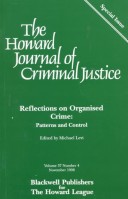This book analyses the ways that some crimes are organized in contemporary Europe and some key aspects of the responses of policing institutions - principally but not exclusively 'the police' - toward those crimes. The authors are critical of the received wisdom about such issues as the monopolistic tendencies of 'Russian organized crime', the globalized sophistication of money-laundering, and the internationalisation of crime syndicates themselves. What they propose - on the basis of an admittedly limited amount of substantiated 'knowledge' - is a more modest analytical model in which the barriers to globalization of ambition, language, contacts and trust are emphasised. We appreciate that there are some 'crime syndicates' - including senior politicians - that operate internationally, generating immense wealth which has to be channelled and legitimized. However, such syndicates do not dominate the supply of most criminal services, still less of predatory crime for gain in most parts of Europe. The book steps back from the sometimes overblown and over-homogenized imagery of 'organized crime' and unpacks its local, regional and international variations.
In doing so, it provides a more sober platform for the understanding of how crimes are organized and how they might be controlled than is offered in contemporary media and law enforcement debates.
- ISBN10 0631214364
- ISBN13 9780631214366
- Publish Date 2 January 1990
- Publish Status Out of Print
- Out of Print 4 December 2008
- Publish Country GB
- Publisher John Wiley and Sons Ltd
- Imprint Blackwell Publishers
- Format Paperback
- Pages 112
- Language English
